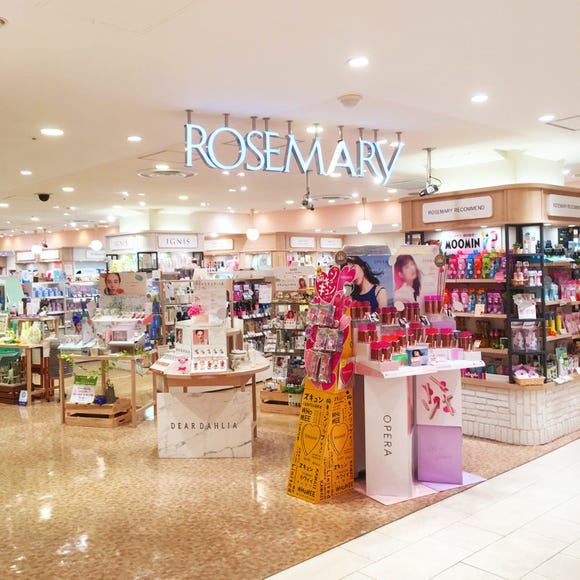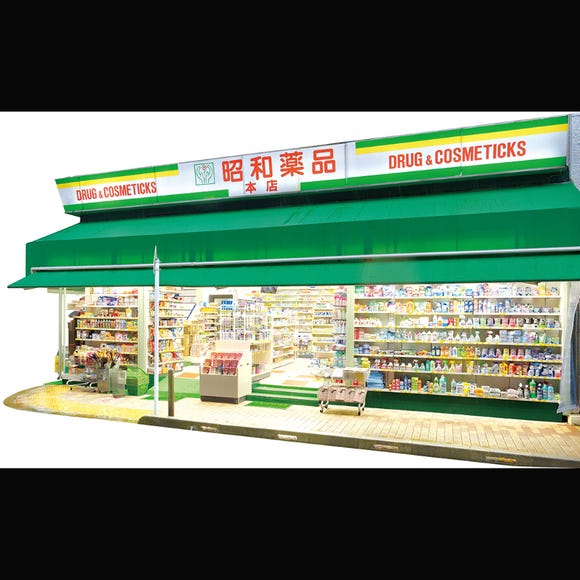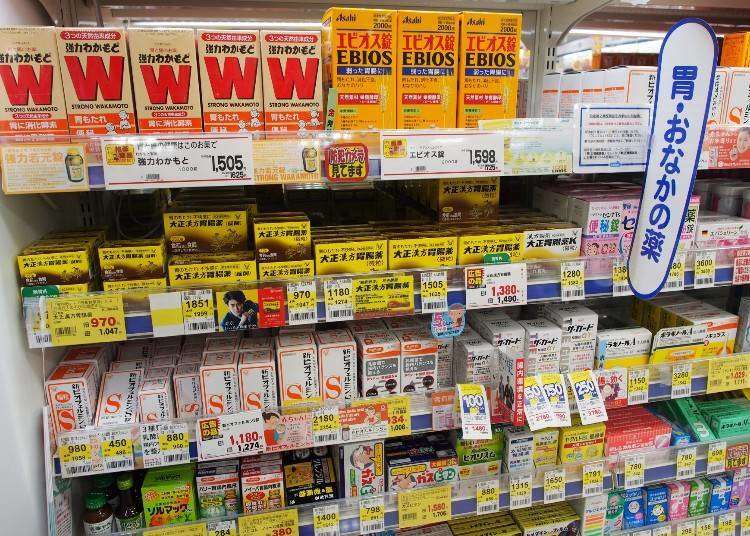
Traveling in Japan is exciting and there is a lot to discover. So much, in fact, that it’s not unlikely that you’ll get to a point where your feet hurt, your head pounds, or you even sniffle and sneeze a bit.
While we hope that you’ll be able to discover Japan’s many charms all healthy and energetic, it’s important to know what to do in the case of a bit of pain or mild sickness that doesn’t necessarily require a visit to the doctor.
Japan’s drugstores are well-stocked and offer a large selection of Japanese medicine for all sorts of common ailments. We have compiled a list of words and vocabulary to get just the right medicine you need!
Colds, Coughs, and Runny Noses
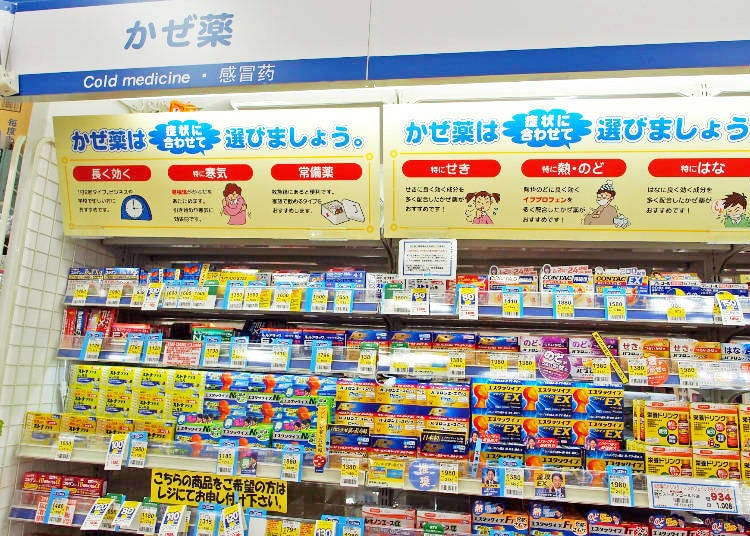
かぜ/風邪 (kaze) – common cold
のど/喉 (nodo) – throat
せき/咳 (seki) – cough
咳きこむ/咳き込む (sekikomu) – violent coughing
たん/痰 (tan) – phlegm
鼻づまり/鼻詰まり (hanazumari) – stuffy nose
くしゃみ (kushami) – sneezing
さむけ (samuke) – shivering
発熱/熱 (netsu) – fever
アレルギー (arerugī) – allergy
ぜんそく/喘息 (zensoku) – asthma
肩こり (katakori) – stiff shoulders
吐き気/はきけ (hakike) – nausea
こみ上げる (komiageru ) – nausea, gagging
抗ヒスタミン剤 (kōhisutaminzai) - antihistamine
Stomach-related Problems
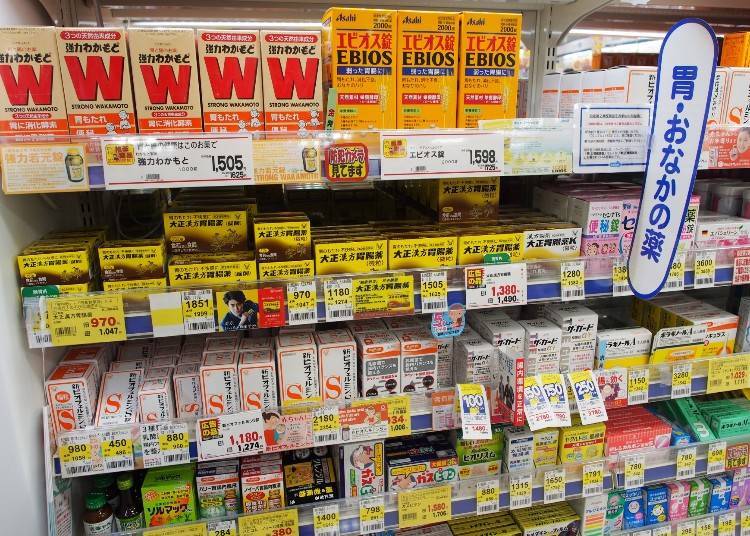
食べ過ぎ/食べすぎ/たべすぎ (tabesugi) – overeating
飲み過ぎ/飲みすぎ/のみすぎ (nomisugi) – excessive drinking
胃もたれ (imotare) – heavy stomach, problematic digestion
胃の不快感 (i no fukaikan) – stomach pain, unpleasantness
おなか (onaka) – stomach
むかつき (mukatsuki) – upset stomach, nausea
むかむか (mukamuka) – sick, queasy feeling, nausea
胸やけ/胸焼け (munayake, muneyake) – heartburn, sour stomach
下痢/げり (geri) - diarrhea
おなかのハリ、おなかのガスだまり (onaka no hari, onaka no gasu-damari) – feeling bloated, gassy
二日酔い (futsukayoi) – hangover
Cuts, Scars, and Skin-related Terms
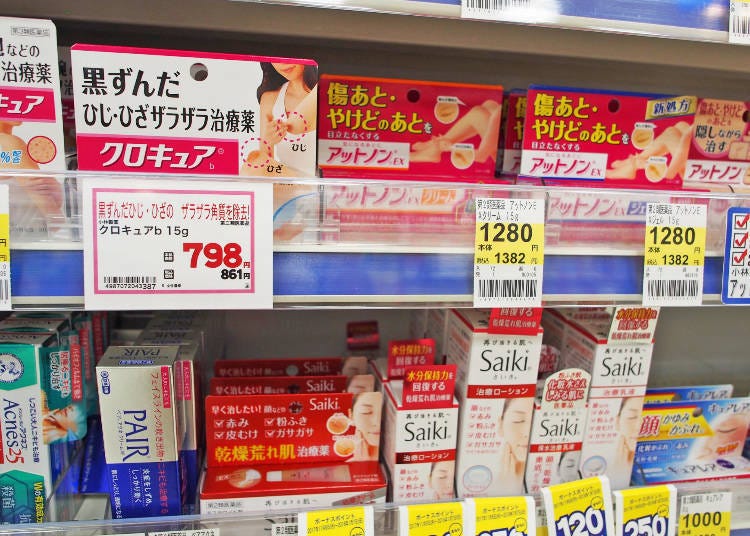
きず (kizu) – wound
あと (ato) – scar, mark
傷あと (kizuato) – scar
やけど (yakedo) – scald, burn
かゆみ (kayumi) – itching
虫刺され/虫さされ (mushi-sasare) – insect bite
しっしん (shisshin) – eczema
かぶれ (kabure) – rash
うおの目/魚の目 (uo no me) – corn (on the foot)
たこ (tako) – callus, corn
いぼ (ibo) – wart
ニキビ (nikibi) – acne
吹き出物 (fukidemono) – skin eruption, acne
おでき (odeki) – blister, pimple
あせも (asemo) – heat rash
ただれ (tadare) – sore, inflammation
荒れ肌 (arehada) – rough, chapped skin
ひび (hibi) – chap
あかぎれ (akagire) – fissure
かさつく (kasatsuku) – dry skin
かきむしる (kakimushiro) – tearing due to dry skin
さかむけ (sakamuke) - hangnail
皮むけ (kawamuke) – skin peeling due to dryness
粉ふき (kofuki) – dry, flaky skin
赤み (akami) – redness
シミ (shimi) – discoloration
そばかす (sobakasu) – freckles
ガサガサ (gasa-gasa) – feeling dry, rough
ヒリヒリ (hiri-hiri) – stinging, burning
ひやけ/日焼け(hiyake) – sunburn, tan
しもやけ/霜焼け (shimoyake) – frostbite
黒ずんだ (kurozunda) – pigmentation
かお (kao) – face
ひじ (hiji) – elbow
ひざ (hiza) – knee
Eye Drops and Related Words
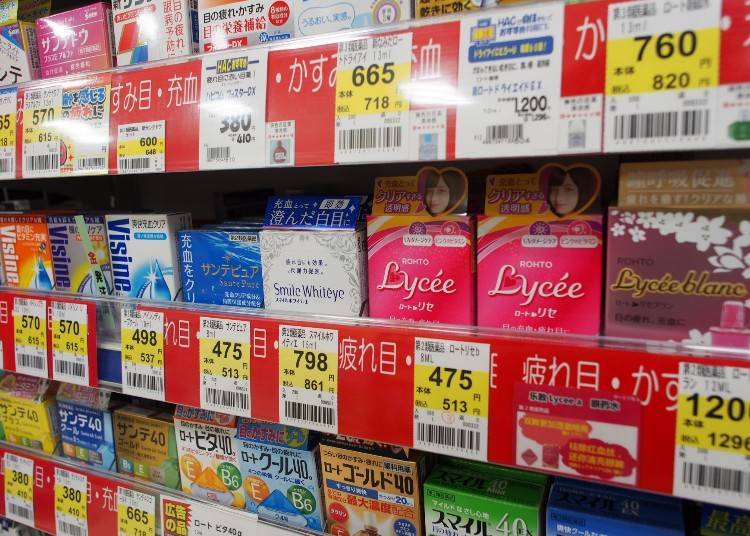
目薬 (megusuri) – eye drops
目のかすみ (me no kasumi) – blurred vision
目のかゆみ (me no kayumi) – itchy eyes
目の疲れ (me no tsukare) – eyestrain
目の渇き/目のかわき (me no kawaki) – dry eyes
ドライアイ (dorai ai) – dry eyes
ブルーライトダメージ (burū raito damēji) – blue light damage
充血クリア (jūketsu kuria) – medicine against bloodshot eyes
コンタクトレンズ/コンタクト/レンズ (kontakuto renzu, kontakuto, renzu) – contact lenses
うるおい (uruoi) – moisture
Supplements and Health Foods
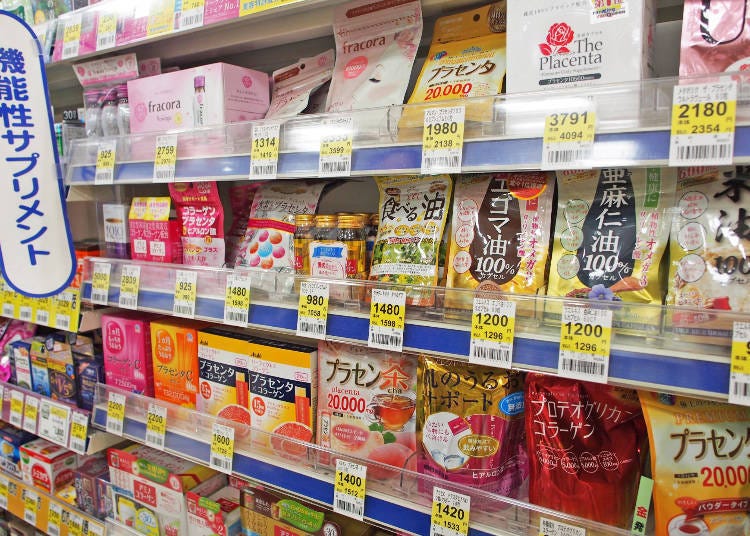
サプリメント (sapurimento) – supplement
栄養ドリンク (eiyō dorinku) – nutritional drink (such as energy or vitamin drinks)
ビタミン (bitamin) – vitamin
マルチビタミン (maruchi bitamin) – multi-vitamin
ミネラル (mineraru) – mineral
マルチミネラル (maruchi mineraru) – multi-mineral
カルシウム (karushiumu) – calcium
ルテイン (rutein) – lutein
ヒアルロン酸 (hiaruronsan) – hyaluronic acid
大豆イソフラボン (daizui isofurabon) – soy isoflavone
プラセンタ (purasenta) – placenta
コラーゲン (korāgen) - collagen
コレステロール (koresuterōru) – cholesterol
カルニチン (karunichin) – carnitine
レシチン (reshichin) – lecithin
イチョウ (ichō) – ginkgo
ウコン (ukon) – turmeric
ローヤルゼリー (rōyaru zerī) – royal jelly
キトサン (kitosan) – chitosan
はとむぎエキス (hatomugi ekisu) – Job’s tears extract
水素 (suiso) – hydrogen
亜鉛 (a’en) – zinc
カロリミット (karorimitto) – calorie limit
ダイエット (daietto) – diet
Other Terms
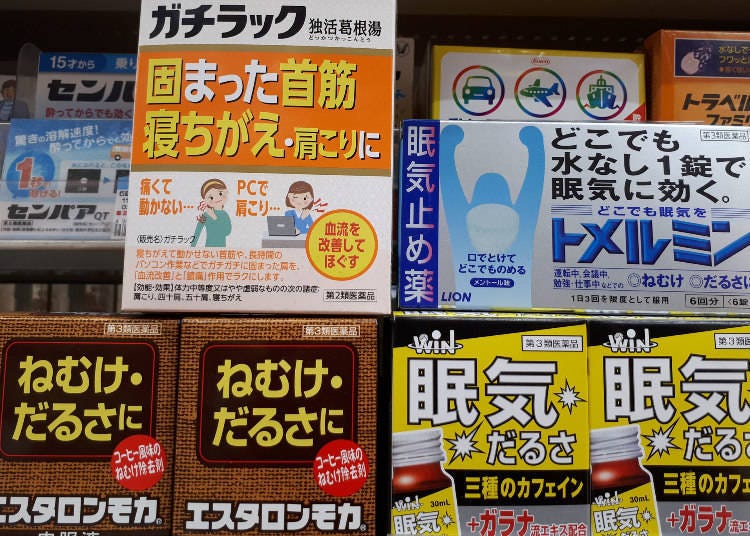
水虫 (mizumushi) – athlete’s foot
打ち身 (uchimi) – bruise
寝違え (nechigae) – neck stiffness
だるさ (darusa) – languor
眠気 (nemuke) – sleepiness
ステロイド (suteroido) – steroids
おむつ (omutsu) - daiper
Terms Related to Medicine Types
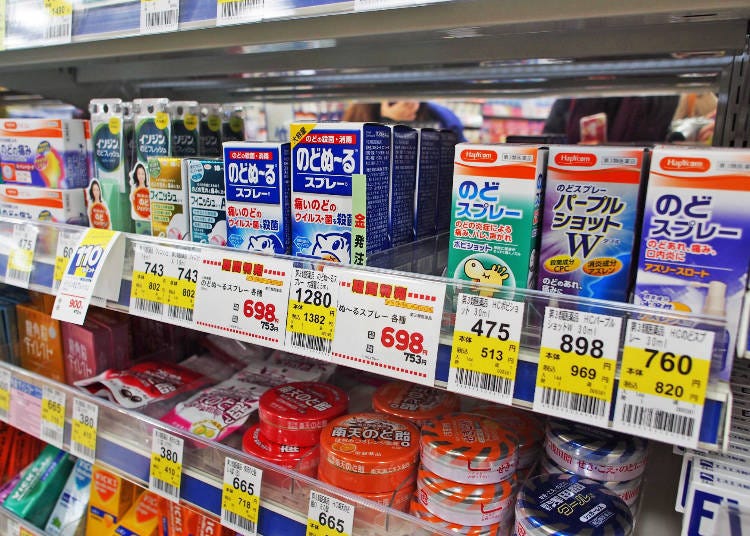
カプセル (kapuseru) – capsule
錠劑 (jōzai) – pill
粉薬 (konagusuri) – powder medicine
うがい薬 (ugai-gusuri) – mouthwash
スティック顆粒 (sutikku karyū) – granule stick
ローション (rōshon) – lotion
ゼリー (zerī) – jelly
クリーム (kurīmu) - cream
クリーミィーゲル (kurīmī geru) – creamy gel
パック (pakku) – bagged
スプレー (supurē) – spray
シップ剤 (shippuzai) – compress
テープ剤 (tēpuzai) – tape
プラスター剤 (purasutāzai) – plaster
パップ剤 (pappuzai) – poultice
つぼ用シール (tsuboyō shīru) – pressure point adhesive
Classifications of Japanese Medicine
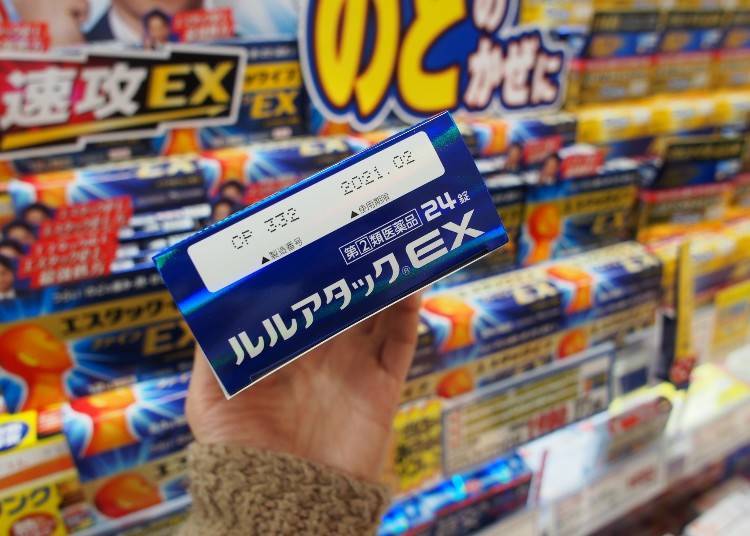
On the package of Japanese medicine, you’ll find characters looking like this: 第○類医薬品. The circle is a stand-in for a number from 1 to 3 and this label refers to the pharmaceutical classification of Japanese medicine. This classification mainly refers to intensity and side effects.
● Class 1 Drugs: cannot be bought directly but are handed out by pharmacists instead. The drugs are generally strong and have various side effects.
● Class 2 Drugs: sold by pharmacists or registered dealers. While class 2 drugs aren’t as intense as class 1 drugs, keep an eye on side effects nonetheless.
● Class “Pharmaceutically Designated 2” Drugs: look out for the characters 第[2]類医薬品 for this special classification. These drugs mustn’t be taken with other medications and are not suitable for pregnant women and children. They’re sold by pharmacists or registered dealers.
● Class 3 Drugs: the regular drugs available at any drugstore. Pharmacists and registered dealers will be able to answer any questions about this over-the-counter medicine. The risk of side effects is low.
Buying Empty Boxes and Packages
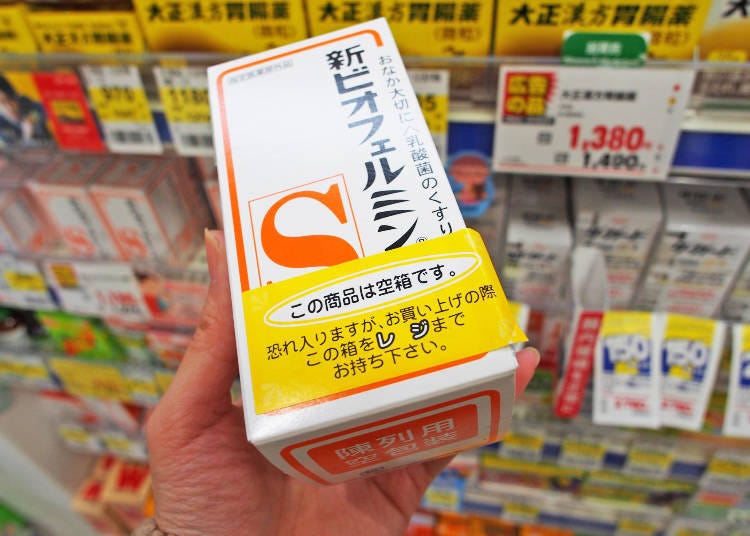
A lot of the medicine available at drugstores is actually just the packaging. Simply take such an empty package to the cash register and, if need be, inform the staff of how much you want to buy. This empty package is then exchanged for the actual medicine by the staff, giving you the opportunity to double-check.
Japanese drugstores tend to have a massive selection of all sorts of drugs and especially if you cannot read the characters, it gets overwhelming really quickly. Knowing what you want to buy a drug or supplement for and being familiar with the Japanese word makes this so much easier! Simply tell the staff and they will guide you to the right drug.
- Area
- Category
*Prices and options mentioned are subject to change.
*Unless stated otherwise, all prices include tax.
Recommended places for you
-

BicCamera Coupon! Tax-free, Plus Discount!
-

5 Quirky Japanese Summer Festivals You Must See: Dancing, Fire, Bellybuttons & More!
-

Experience the Magic: Mt. Fuji and Lake Kawaguchi Fireworks Festival (August)
-

Top Tips for Tourists! Roppongi Project for Safety and Peace of Mind: Creating a Fun and Safe Roppongi for All
-

Beat the Heat in Japan's Famous Hot Springs: 5 Recommended Summer Springs
-

Shinjuku Shopping Guide: 15 Must-Visit Stores for Exclusive Deals in Tokyo
Inspiration for Accommodations
-

10 Asakusa Hotels Featuring Views of Tokyo Skytree®
-

8 Scenic Hakone Lodgings with Breathtaking Views of Mount Fuji from Your Room
-

Make Your Tokyo Stay Comfortable! 10 Convenient Hotels with Airport Shuttle Service
-

10 Open-air bath Onsen Ryokans in Hakone for Ultimate Relaxation
-

10 Family-Friendly Hotels with Comfortable Family Rooms in Asakusa
-

Asakusa's Comfortable Long Stay Hotels: 10 Picks with Complete Kitchens
-

Experience Luxury: Hakone's 10 Best Five-Star Accommodations
-
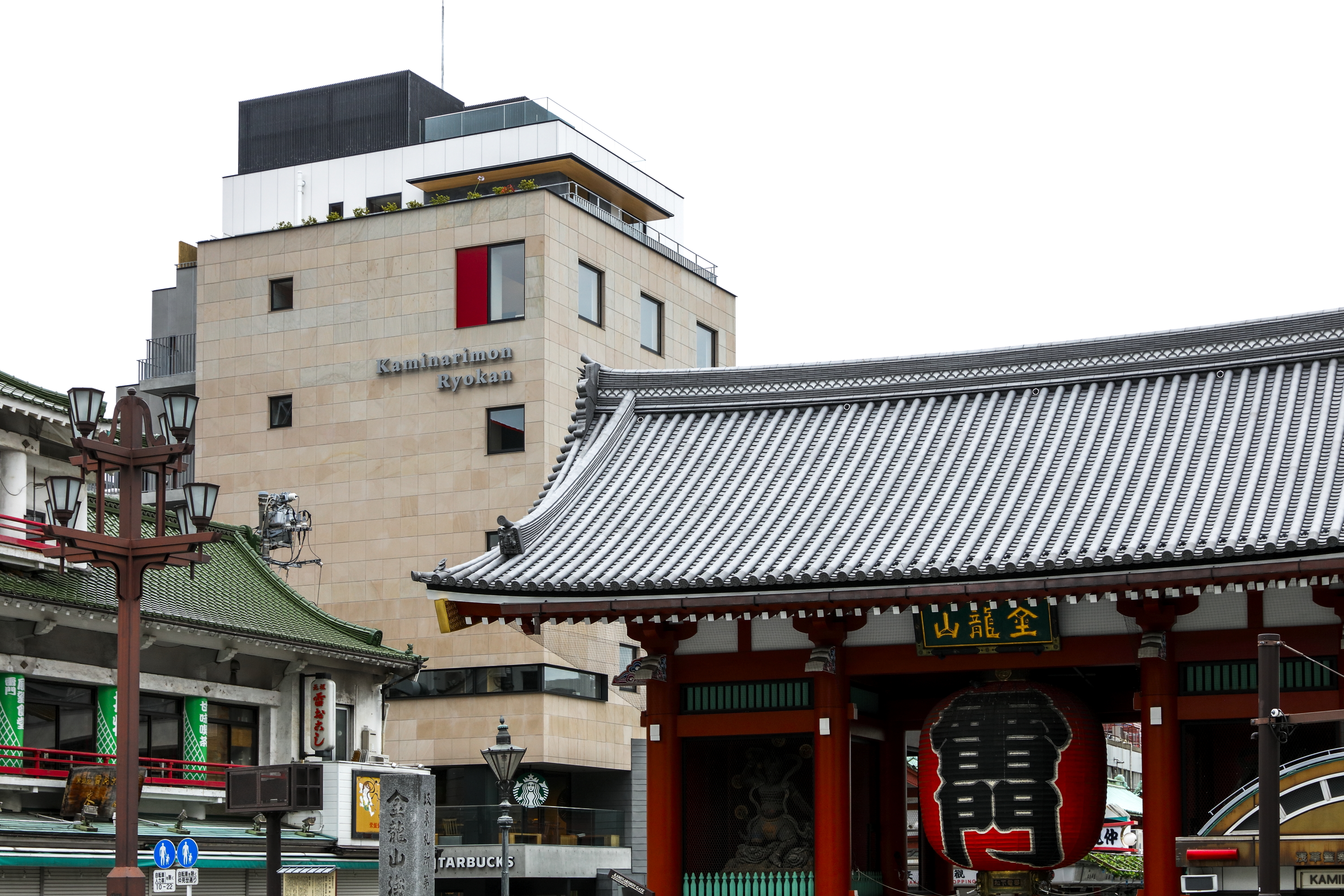
Best Picks for Hotels Near Asakusa Station – Top 10 List
-

10 Best Hotels in Tokyo with Gyms for a Comfortable Workout Experience
-

Enjoy a Comfortable Stay!10 Concierge Service Hotels in Hakone
-

Buyers Guide: 9 Top-Selling Quality Japanese Cosmetics For Under $15!
-

Healthcare in Japan for Tourists: What to Do When You Get Sick or Injured in Japan
-

Complete Shinjuku Guide: All Drug Stores & Electronic Retail Stores in the Area!
-

Tips from Japanese Working Women: a Fancy Daily Routine with Can★Do 100 Yen Shop Beauty Goods
-

Ueno Station Area Guide: Fun Ways to Explore Tokyo's Popular Destination (Area Map & Sightseeing Tips)
-

Bestsellers at BicCamera: 10 Must-Have Japanese OTC Medicines & Supplements
- #best ramen tokyo
- #what to buy in ameyoko
- #what to bring to japan
- #new years in tokyo
- #best izakaya shinjuku
- #things to do tokyo
- #japanese nail trends
- #what to do in odaiba
- #onsen tattoo friendly tokyo
- #daiso
- #best sushi ginza
- #japanese convenience store snacks
- #best yakiniku shibuya
- #japanese fashion culture
- #best japanese soft drinks


















